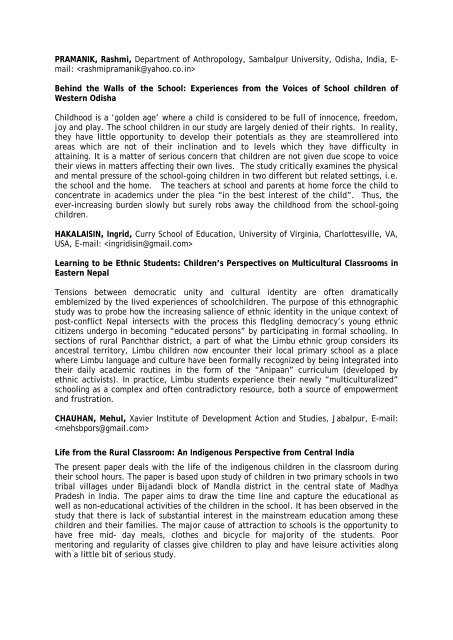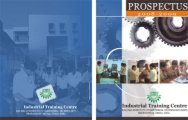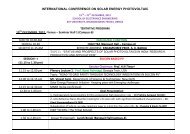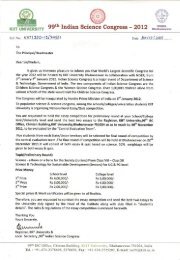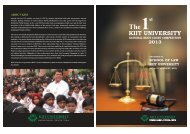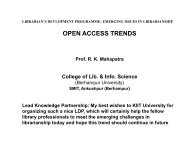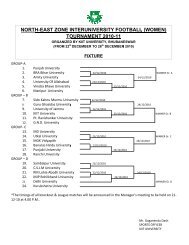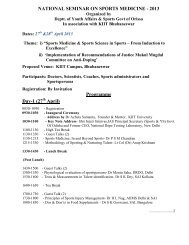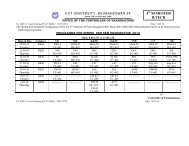PANEL ORGAN - KIIT University
PANEL ORGAN - KIIT University
PANEL ORGAN - KIIT University
You also want an ePaper? Increase the reach of your titles
YUMPU automatically turns print PDFs into web optimized ePapers that Google loves.
PRAMANIK, Rashmi, Department of Anthropology, Sambalpur <strong>University</strong>, Odisha, India, E-<br />
mail: <br />
Behind the Walls of the School: Experiences from the Voices of School children of<br />
Western Odisha<br />
Childhood is a ‘golden age’ where a child is considered to be full of innocence, freedom,<br />
joy and play. The school children in our study are largely denied of their rights. In reality,<br />
they have little opportunity to develop their potentials as they are steamrollered into<br />
areas which are not of their inclination and to levels which they have difficulty in<br />
attaining. It is a matter of serious concern that children are not given due scope to voice<br />
their views in matters affecting their own lives. The study critically examines the physical<br />
and mental pressure of the school-going children in two different but related settings, i.e.<br />
the school and the home. The teachers at school and parents at home force the child to<br />
concentrate in academics under the plea “in the best interest of the child”. Thus, the<br />
ever-increasing burden slowly but surely robs away the childhood from the school-going<br />
children.<br />
HAKALAISIN, Ingrid, Curry School of Education, <strong>University</strong> of Virginia, Charlottesville, VA,<br />
USA, E-mail: <br />
Learning to be Ethnic Students: Children’s Perspectives on Multicultural Classrooms in<br />
Eastern Nepal<br />
Tensions between democratic unity and cultural identity are often dramatically<br />
emblemized by the lived experiences of schoolchildren. The purpose of this ethnographic<br />
study was to probe how the increasing salience of ethnic identity in the unique context of<br />
post-conflict Nepal intersects with the process this fledgling democracy’s young ethnic<br />
citizens undergo in becoming “educated persons” by participating in formal schooling. In<br />
sections of rural Panchthar district, a part of what the Limbu ethnic group considers its<br />
ancestral territory, Limbu children now encounter their local primary school as a place<br />
where Limbu language and culture have been formally recognized by being integrated into<br />
their daily academic routines in the form of the “Anipaan” curriculum (developed by<br />
ethnic activists). In practice, Limbu students experience their newly “multiculturalized”<br />
schooling as a complex and often contradictory resource, both a source of empowerment<br />
and frustration.<br />
CHAUHAN, Mehul, Xavier Institute of Development Action and Studies, Jabalpur, E-mail:<br />
<br />
Life from the Rural Classroom: An Indigenous Perspective from Central India<br />
The present paper deals with the life of the indigenous children in the classroom during<br />
their school hours. The paper is based upon study of children in two primary schools in two<br />
tribal villages under Bijadandi block of Mandla district in the central state of Madhya<br />
Pradesh in India. The paper aims to draw the time line and capture the educational as<br />
well as non-educational activities of the children in the school. It has been observed in the<br />
study that there is lack of substantial interest in the mainstream education among these<br />
children and their families. The major cause of attraction to schools is the opportunity to<br />
have free mid- day meals, clothes and bicycle for majority of the students. Poor<br />
mentoring and regularity of classes give children to play and have leisure activities along<br />
with a little bit of serious study.


